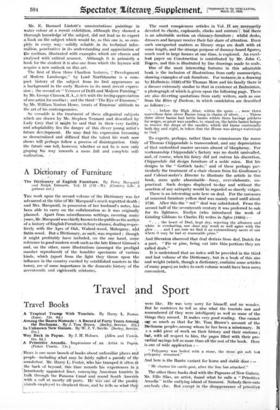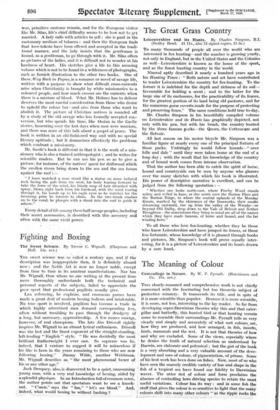Travel and Sport
Travel Books
- 21s.)
A Primitive- Arcadia. Impressions ot_ao Artist in PaptUt. (Fisher Unwin. 15s.), HERE is one more bunch of books about unfamiliar places and people—including what may. be fairly called a parody of the wanderlust. Mr. Harry Foster, who has tramped it often at the back of beyond, this time records his experiences in .o. `-luxuriously appointed liner, convoying American tourists in bulk through the Panama Canal and round South America with a call at mostly alt ports. Ife—sfria- one of the profet- kionals employed to shepherd- them, and he tells us what- they were like. Ile was very sorry for himself, and no wonder. But he contrives to tell us also what the tourists saw and remembered (if they were intelligent) as well as some of the things they missed. It makes very good reading. One cannot sear so much as that for -Mr. Toni 'Brown's account of the Bechuana peoples, among whom he Ma been a missionary.. It s a solid 'piece of work on their history. and- their customs ; but, with all respect to him, the pages filled- with their pro- verbial sayings tell us-more than all the rest of-the book. Here is,one of wide application = - " Polygamy was boiled with a stone, the itonelgOt. soft but polygamy- remained." And here is the Bantu variant for lioise and stablee-door :— " He charms his cattle-post, after the lion has attacked."
The other three books deal with the Papuans of New Guinea. Mr. Ellis Silas, an artist, found what he calls a " Primitive Arcadia " in the outlying island of Samarai. Nobody there eats anybody else. But except in the disappearance of primitiye
war, primitive customs remain, and-for the -European visitor like Mr. Silas, life's chief difficulty seems to be how not to get married. A lady calls with articles to_sell ; she is paid in the customary medium of tobacco.: , and then the European finds that love-tokens have been offered and accepted in the tradi- tional manner, and the lady insists that the gentleman is bound, as a gentleman, to go through with it. Mr. Silas offers us pictures of the ladies, and it is difficult not to wonder at his hardness of heart. His sketches give a life to this amusing volume which is not to be found in a wilderness of photographs, such as furnish illustration to the other two books. One of these, Way Back in Papua, is a romance or novel of savage life, written with a purpose to show what difficult cross-currents .arise when Christianity is brought by white missionaries to a coloured people, and how much crosser are the currents when there is a mixture of blood. What Mr. Holmes has to deliver deserves the most careful consideration from those who desire to uphold the colour bar—and also from those who want to abolish it. The picture of Christian natives is rounded off by a study of the old savage who has formally accepted con- version, but who spends his time, like Ossian in the Gaelic stories, lamenting over the lost days when men were warriors, and there was none of this talk about a gospel of peace. The book is written in an old-fashioned way and with no special literary aptitude ; but it dramatizes effectively the problem which confront a missionary.
Mr. Savile's book is different in that it is the work of a mis- sionary who is also a trained anthropologist ; and he writes for scientific readers. But he can use his pen so as to give a picture, for instance, of the natives' quest for driftwood which the swollen rivers bring down to the sea and the sea tosses against the reef :-
" I have watched a man stand like a statue on some isolated rock facing the gale from the west, his body leaning forward to take the force of the wind, his frizzly mop of hair drenched with spray, blown right back from his forehead, with the wind tearing through it, his hands up to his eagle eyes as he watches for the incoming prize he intends to claim. As the tree-trunk crashes on to the coral, he plunges with a shout into the surf to guide it ashore."
Every detail of life among these half savage peoples, including their secret ceremonies, is described with this accuracy and often with the same vivid power.























































 Previous page
Previous page